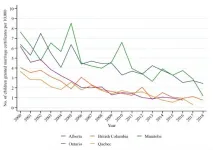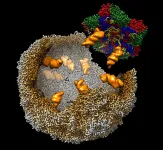(Press-News.org) A year ago, trying to find patients who would agree to see their University of Michigan mental health provider through a video screen felt like pulling teeth.
Only 26 video visits with a few early-adopters had happened in nearly six months, compared with more than 30,000 in-person visits.
But Jennifer Severe, M.D., one of the three psychiatrists who helped launch a test of telehealth initiatives in the U-M's outpatient psychiatry clinic, wasn't about to give up.
She prepared to give a talk at the beginning of April of 2020, hoping to convince more of her colleagues to give telepsychiatry a try, now that a major insurance company was paying for it. She even had examples of how clinic staff had "rescued" the care of patients who had called at the last minute to cancel an appointment for their depression or bipolar disorder, but agreed to a video therapy session instead.
Severe never got to give that talk.
Instead, on March 23, all non-urgent health care across the state of Michigan shut down to prevent the spread of COVID-19. And video chats and phone calls became the only way for most patients to connect with their psychiatrists and psychologists from Michigan Medicine, U-M's academic medical center.
For nearly all of those patients, it has stayed that way for the past nine months.
Now, a new study led by Severe suggests that more than half of those patients will want to keep going with virtual mental health care even after the pandemic subsides.
According to the new findings published in JMIR Formative Research, the convenience of seeing a provider without leaving home, and avoiding potential exposure to the coronavirus especially for those with other underlying health concerns, factor heavily into this preference. So does a patient's initial experience with seeing a provider virtually.
Patient preferences
The data come from a summer 2020 phone survey of 244 patients or parents of patients who had had appointments scheduled with a U-M mental health provider in the first weeks of the pandemic-related shutdown. Nearly 83% decided to have their or their child's first pandemic-era appointment through a video chat instead.
But the study also suggests a need for special attention to the minority of patients who initially chose to continue psychiatric care through telephone calls.
Though this accounted for less than 14% of the study population, they were more likely to be over 45. By summer, they were much less likely to want to receive mental health care remotely in the future.
As health insurers and government agencies make decisions about whether and how to pay mental health providers for virtual care in the short- and long-term, the new data could help inform them, says Severe.
"We went from not getting much traction with telepsychiatry, and encountering a lot of reluctance among providers and patients, to having nearly all our care delivered virtually, and offering help to those who need it," she says. "These data suggest an opportunity to turn the experience of the pandemic into an opportunity to improve access to mental health care and improve the continuity of care. But policy and reimbursement decisions will be important."
More about the study
Nearly all the patients in the study group who had a virtual visit by summer said it went as well as they had expected, or better.
The study does not cover the period after Mary Carol Blazek, M.D., the study's senior author, led the development of a program called GET Access. It helps older adults prepare for video visits with a geriatric psychiatry specialist.
Michigan Medicine also now offers assistance for any patient with a scheduled appointment, to help them set up their online patient portal account and test the video visit technology within it.
Parents of children receiving mental health or behavioral health care from Department of Psychiatry providers especially noted that video visits were more engaging.
Phone-visit patients said it was important to have the option to talk when their internet connection was unstable or they had trouble with the video platform. One-third said they were just more comfortable talking by phone.
Impacts on access
Although the new paper does not examine clinic appointment cancellation and no-show rates, anecdotal evidence suggests that it has come down substantially from a one-in-four rate before the pandemic.
Whether it's the debilitating effect of their mental health condition, or their access to transportation, time off from work or child care, many factors can get in the way of a patient making it to an in-person appointment, Severe says. But virtual visits remove most of these barriers.
Cost poses another potential barrier for phone-based care. In the test-run months before COVID-19, insurers wouldn't typically cover phone calls, leaving the provider to absorb the cost or to ask patients to pay out of pocket to talk on the phone with their provider.
Insurers covered phone-based mental health care for much of 2020, but that appears to be ending soon. But Severe says that for certain patients with an established relationship with their mental health provider, phone and video appointments are equally effective and should receive similar reimbursement from insurers. Both modality offer opportunity for a blended care model bridging in-person session with virtual visits as deemed appropriate".
"For the first visit with a new patient, we try to avoid using phone as it limits the initiation of the provider-patient therapeutic alliance, reduce communication cues and limits the mental status exam that includes observing patient facial expressions, interactions, and movement," she says. "Depending on the complexity of the patient's situation, we may need to do a physical examination from time to time, to assess their balance and mobility, and check for medication side effects to name a few."
Going forward, Severe hopes to study more aspects of telepsychiatry in the COVID-19 era, including understanding how socioeconomic status, rural vs. urban residence, technology access and other factors play into access. She notes that the study team chose to conduct their study by phone, instead of reaching out via email or patient portal message, to ensure maximum access.
INFORMATION:
In addition to Severe and Blazek, the new study was done by Ruiqi Tang, Faith Horbatch, Regina Onishchenko, and Vidisha Naini. Members of the Michigan Medicine Office of Patient Experience were instrumental in this endeavor and included Jen Sullivan, Caitlin Hanna, Darnysus Jackson and Rose Juhasz.
Eating a healthy diet, such as the Mediterranean diet, has a positive impact on health, but little is known about the effects of including unhealthy foods in an otherwise healthy diet. Now researchers at Rush University Medical Center have reported diminished benefits of a Mediterranean diet among those with high frequency of eating unhealthy foods. The results of their study were published in Alzheimer's & Dementia: The Journal of the Alzheimer's Association on Jan. 7.
"Eating a diet that emphasizes vegetables, fruit, fish and whole grains may positively affects a person's health," said Puja Agarwal, PhD, a nutritional epidemiologist and assistant professor in the Department of Internal Medicine at Rush Medical College. "But when it is combined with fried food, ...
In a technique known as DNA origami, researchers fold long strands of DNA over and over again to construct a variety of tiny 3D structures, including miniature biosensors and drug-delivery containers. Pioneered at the California Institute of Technology in 2006, DNA origami has attracted hundreds of new researchers over the past decade, eager to build receptacles and sensors that could detect and treat disease in the human body, assess the environmental impact of pollutants, and assist in a host of other biological applications.
Although the principles of DNA origami are straightforward, the technique's tools and methods for designing new structures are not always easy to grasp and have not been well documented. In addition, scientists new to the method have had no single reference they ...
Canada is at the forefront of global efforts to end child marriage abroad. Yet this practice remains legal and persists across the country. In Canada, more than 3,600 marriage certificates were issued to children, usually girls, under the age of 18 between 2000 and 2018, according to a new study from researchers at McGill University. In recent years, an increasing number of child marriages have been common-law unions.
Child marriage, defined as formal or informal (common-law) marriage before the age of 18, is a globally-recognized indicator of gender inequality because the negative consequences for ...
BOSTON - Patients with tuberous sclerosis complex, a genetic disorder characterized by the growth of noncancerous tumors in multiple organs of the body, have limited treatment options. A team led by investigators at Massachusetts General Hospital (MGH) has now shown that gene therapy can effectively treat mice that express one of the mutated genes that cause the disease. The research is published in Science Advances.
The gene, called TSC2, codes for tuberin, a protein that acts to inhibit cell growth and proliferation. When mutations occur in TSC2, resulting in a lack of tuberin in cells, the cells enlarge ...
ORLANDO, Jan. 8, 2021 - Florida's threatened coral reefs have a more than $4 billion annual economic impact on the state's economy, and University of Central Florida researchers are zeroing in on one factor that could be limiting their survival - coral skeleton strength.
In a new study published in the journal Coral Reefs, UCF engineering researchers tested how well staghorn coral skeletons withstand the forces of nature and humans, such as impacts from hurricanes and divers.
The researchers subjected coral skeletons to higher stresses than those caused by ocean waves, says Mahmoud Omer, a doctoral student in UCF's Department ...
A research team at the University of Basel has discovered immune cells resident in the lungs that persist long after a bout of flu. Experiments with mice have shown that these helper cells improve the immune response to reinfection by a different strain of the flu virus. The discovery could yield approaches to developing longer-lasting vaccinations against quickly-mutating viruses.
At the start of the coronavirus pandemic, some already began to raise the question of how long immunity lasts after weathering SARS-CoV-2. The same question has now arisen regarding the COVID-19 vaccination. A key role is played by immunological memory - a complex interplay of immune cells, antibodies and signaling ...
Humans have them, so do other animals and plants. Now research reveals that bacteria too have internal clocks that align with the 24-hour cycle of life on Earth.
The research answers a long-standing biological question and could have implications for the timing of drug delivery, biotechnology, and how we develop timely solutions for crop protection.
Biological clocks or circadian rhythms are exquisite internal timing mechanisms that are widespread across nature enabling living organisms to cope with the major changes that occur from day to night, even across seasons.
Existing inside cells, these molecular rhythms use external cues such as daylight and temperature to synchronise ...
CORVALLIS, Ore. - Efficiently mass-producing hydrogen from water is closer to becoming a reality thanks to Oregon State University College of Engineering researchers and collaborators at Cornell University and the Argonne National Laboratory.
The scientists used advanced experimental tools to forge a clearer understanding of an electrochemical catalytic process that's cleaner and more sustainable than deriving hydrogen from natural gas.
Findings were published today in Science Advances.
Hydrogen is found in a wide range of compounds on Earth, most commonly combining with oxygen to make water, and it has many scientific, industrial and energy-related roles. It also occurs in the form of hydrocarbons, compounds consisting of hydrogen and carbon such ...
Researchers have for the first time identified the way viruses like the poliovirus and the common cold virus 'package up' their genetic code, allowing them to infect cells.
The findings, published today (Friday, 8 January) in the journal PLOS Pathogens by a team from the Universities of Leeds and York, open up the possibility that drugs or anti-viral agents can be developed that would stop such infections.
Once a cell is infected, a virus needs to spread its genetic material to other cells. This is a complex process involving the creation of what are known as virions - newly-formed infectious copies of the virus. Each virion is a protein shell containing a complete copy of the virus's genetic code. ...
Corals have evolved over millennia to live, and even thrive, in waters with few nutrients. In healthy reefs, the water is often exceptionally clear, mainly because corals have found ways to make optimal use of the few resources around them. Any change to these conditions can throw a coral's health off balance.
Now, researchers at MIT and the Woods Hole Oceanographic Institution (WHOI), in collaboration with oceanographers and marine biologists in Cuba, have identified microbes living within the slimy biofilms of some coral species that may help protect the coral against certain nutrient imbalances.
The team found these microbes can take up and ...





